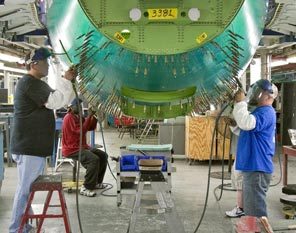Boeing plans big cut
 Boeing will slash 17,000 jobs and delay the 777X jet as financial pressures mount due to an ongoing worker strike.
Boeing will slash 17,000 jobs and delay the 777X jet as financial pressures mount due to an ongoing worker strike.
The job cuts, representing 10 per cent of the global workforce, are part of a strategy to reduce costs amid halted production and mounting losses.
CEO Kelly Ortberg told employees the layoffs were necessary to address Boeing’s financial realities.
“We reset our workforce levels to align with our financial reality and to a more focused set of priorities,” Ortberg said, according to reports.
These reductions will impact staff at all levels, including executives and managers.
The strike, which began on September 13 and involves 33,000 workers, has shut down production of Boeing's 737 MAX, 767, and 777 jets.
Boeing anticipates US$5 billion in pre-tax earnings charges in the third quarter and revenue of US$17.8 billion, alongside a projected loss per share of US$9.97.
The financial hit from the strike is significant, with ratings agency S&P estimating it costs Boeing $1 billion per month.
There is growing concern that the company could lose its prized investment-grade credit rating as it faces mounting debt, which currently totals $60 billion.
Boeing has also confirmed that the first deliveries of its 777X jet will be delayed until 2026. The aircraft, initially set for a 2020 launch, has faced numerous setbacks.
Boeing also announced it will discontinue the 767 freighter program by 2027, although production of the KC-46A military tanker will continue.
The International Association of Machinists and Aerospace Workers (IAM), representing the striking workers, criticised Boeing's actions, especially the decision to discontinue the 767 freighter.
IAM leaders condemned Boeing’s unfair labour practice charge, stating it detracts from constructive negotiations.
Jon Holden, President of IAM District 751, warned that Boeing’s approach would only prolong the strike.
Thomas Hayes, an equity manager at Great Hill Capital, suggested the layoffs could pressure workers to end the strike sooner rather than later.
“Striking workers who temporarily do not have a paycheck do not want to become unemployed workers who permanently do not have a paycheck,” Hayes noted.
Boeing continues to grapple with multiple challenges beyond the strike.
Earlier this year, the company faced scrutiny after a mid-air panel blowout on one of its 737 MAX planes, which exposed safety lapses and led U.S. regulators to impose restrictions on production.
To stabilise its financial position, Boeing is exploring raising billions of dollars through stock sales and other securities.
Analysts estimate the company needs to raise between $10 billion and $15 billion to preserve its credit rating.
Despite the difficulties, Ortberg remains confident in Boeing’s long-term prospects, stating that the company is making “strategic decisions for our future”.
Boeing’s third-quarter earnings report, due on October 23, will shed more light on its financial outlook.








 Print
Print